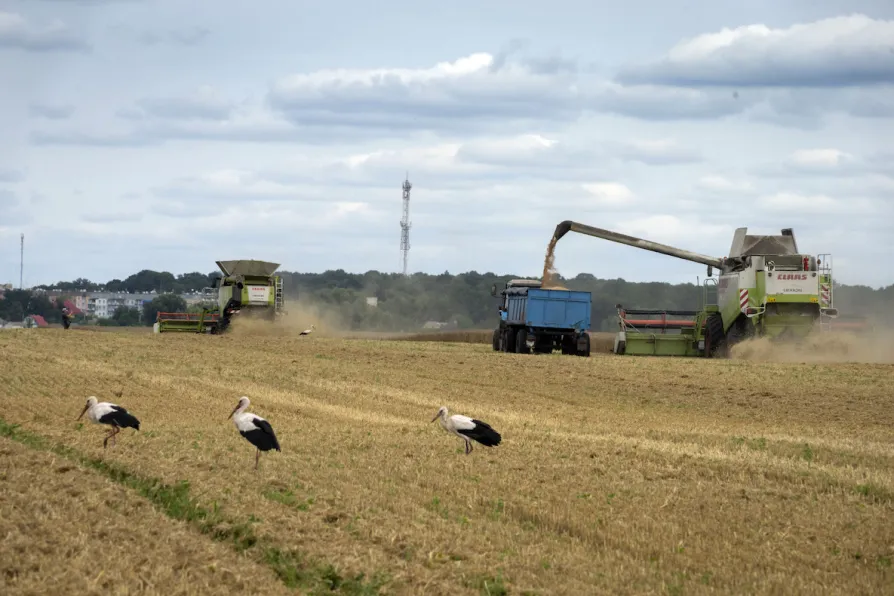
 Storks walk in front of harvesters in a wheat field in the village of Zghurivka, Ukraine, on Aug. 9, 2022.
Storks walk in front of harvesters in a wheat field in the village of Zghurivka, Ukraine, on Aug. 9, 2022.
RUSSIA suspended a deal allowing war-torn Ukraine to export grain to countries struggling with hunger and poverty today, calling for its own demands on food and fertiliser shipments to be met.
The agreement, brokered last summer by the United Nations and Turkey, cleared the way for grain to be exported through the Black Sea to Africa, Middle East and Asia after Russia’s invasion worsened the global food crisis.
Its suspension came just hours after Moscow accused of Ukraine of attacking the Crimean Bridge again.
Two people were killed and their daughter was wounded in what Russia called a terror attack on the major artery for its troops fighting in Ukraine.
Kremlin spokesman Dmitry Peskov said the two events were not connected, adding: “In fact, the Black Sea agreements ceased to be valid today.
“Unfortunately, the part of these Black Sea agreements concerning Russia has not been implemented so far, so its effect is terminated.”
Russia and Ukraine are two of the world’s top agricultural producers and major suppliers of wheat, barley, sunflower oil and other affordable food products that developing nations rely on.
While Russian exports of food and fertiliser are not subject to the Western sanctions imposed after the invasion began in February 2022, Moscow has said that restrictions on payments, logistics and insurance have created a barrier to shipments.
The Black Sea Grain Initiative has allowed three Ukrainian ports to export 36.2 million tons of grain and other food to the world since last August, according to the Joint Co-ordination Centre in Istanbul.
Russia has repeatedly complained that the deal largely benefits richer nations.
The World Food Programme regained a top supplier under the deal, allowing 725,000 metric tons of humanitarian food aid to leave Ukraine and reach countries on the brink of famine, including Ethiopia, Afghanistan and Yemen.
The International Rescue Committee calls the grain deal a “lifeline for the 79 countries and 349 million people on the front lines of food insecurity.”
Losing millions of tons of food from Ukraine at a time when many countries are increasingly reliant on imported supplies because of conflict and drought “will result in inaccessibility and unavailability of food but also will increase prices and impact affordability for households,” said Shashwat Saraf, the group’s regional emergency director for East Africa.
Fallout from the Covid-19 pandemic, conflict, economic crises, drought and other climate factors also affect food scarcity.

Home Secretary Cooper confirms plans to ban the group and claims its peaceful activists ‘meet the legal threshold under the Terrorism Act 2000’

US president says his nation might join forces with Israel in attacking Iran
















